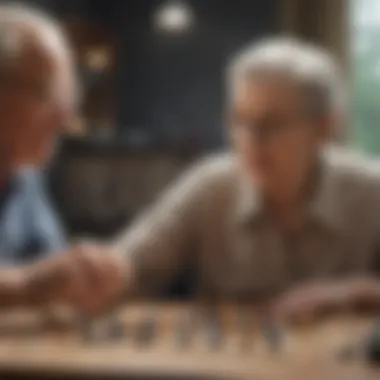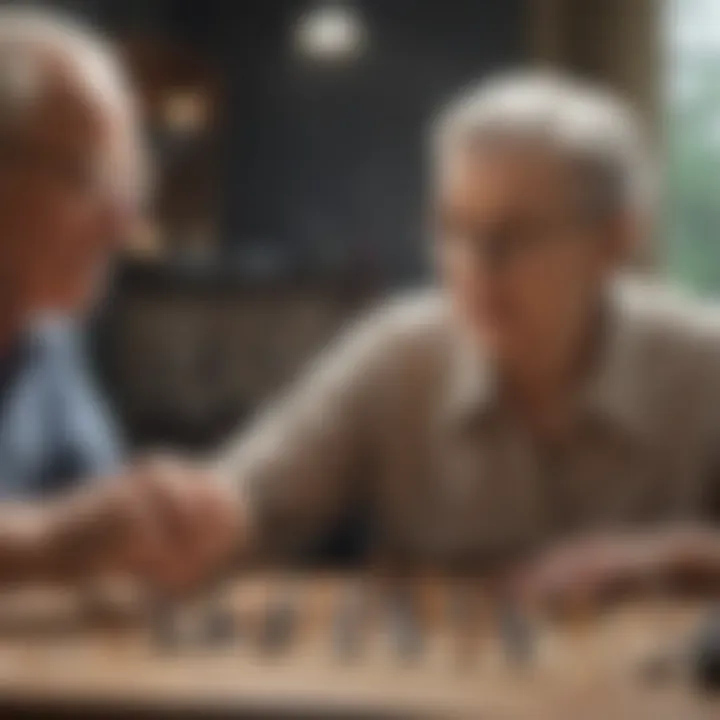Engaging Activities to Boost Seniors' Brain Health


Intro
As the golden years approach, many contemplate what it means to maintain a sharp mind. Cognitive decline is a common worry for older adults, yet engaging in mentally stimulating activities can serve as a proactive way to combat this decline. Cognitive health isn’t just about keeping the brain working; it’s also essential for enjoying life fully and maintaining independence. Through this exploration, we aim to discern how seniors can foster their mental agility by integrating enjoyable and challenging tasks into their daily routines.
Background and Context
Overview of the research topic
Growing understanding has emerged about the connection between engaging activities and cognitive health. Research suggests that mental stimulation protects against cognitive decline and enhances brain plasticity, a phenomenon essential for learning and memory. For senior citizens, keeping those mental gears turning can make a significant difference, not only in memory but also in overall well-being and quality of life.
Brain activities vary widely, from puzzles and games to creative arts, offering multiple avenues for older adults. Each interaction has potential benefits that transcend mere recreation; they can lead to lasting improvements in both mental health and cognitive function. In exploring these activities, one can also appreciate the interplay between emotional fulfillment and cognitive enhancements.
Historical significance
Historically, elderly populations have been viewed through a rather narrow lens, often characterized by decline and dependency. However, the tide is changing. Early scholarship highlighted the importance of lifelong learning, while recent studies have illuminated how different forms of engagement can augment cognitive longevity. One could argue that engaging in activities is not just a trend but a return to values that have long been overlooked. Historically, communities utilized various forms of interactive and cognitive-based activities to foster social connection and mental stimulation.
Key Findings and Discussion
Major results of the study
The findings underscore several types of beneficial activities for seniors:
- Puzzles: These can range from crosswords to sudoku, providing both challenge and enjoyment. Research indicates that regularly engaging in puzzles can improve memory and problem-solving skills.
- Artistic expression: This might include painting, sewing, or even coloring. Such creative outlets have shown promise in enhancing mood while also improving cognitive flexibility.
- Social games: Board games and card games are more than just pastimes; they also cultivate social interaction and strategic thinking, critical aspects of cognitive health.
"Engaging in mentally stimulating activities is like a workout for the brain — the more you do, the better it performs."
Detailed analysis of findings
Each activity caters to specific cognitive functions. Puzzles are excellent for memory improvement, as they require recall and pattern recognition. In contrast, artistic activities tap into creativity and emotional expression, which can elevate mood and foster a sense of accomplishment. Getting together for board games offers not only an intellectual challenge but also the joy of companionship, which is a powerful catalyst for mental well-being.
Moreover, these activities are often flexible, allowing seniors to engage according to their interests and capabilities. They don’t require extensive resources or specialized skills, making them accessible for many. Integrating such activities into daily life can yield tremendous benefits over time. The underlying theme here revolves around engagement — the more seniors immerse themselves in these stimulating experiences, the greater their cognitive vitality.
Prelude to Brain Activities for Seniors
As the golden years approach, it becomes imperative for individuals to engage their minds just as much as their bodies. Cognitive activities for seniors serve as a vital link in maintaining not only mental agility but also a higher quality of life. Brain activities encompass a range of stimulating practices, from complex puzzles to simple memory games, all designed to challenge the mind and foster connections within the brain and to their wider world.
Why Focus on These Activities? The importance of cognitive engagement can't be overstated. Engaging activities not only help in keeping the mind sharp, but they also can delay the onset of cognitive decline. Think of the brain as a muscle; the more it's used, the stronger it becomes.
There are several compelling benefits associated with brain activities:
- Mental Stimulation: Participating in thought-provoking tasks helps to promote mental elasticity, building neural connections that can safeguard against memory loss.
- Social Interaction: Many cognitive activities encourage collaboration. Social engagement has proven benefits for emotional health, reducing feelings of loneliness and fostering a sense of community among seniors.
- Emotional Well-being: Engaging in enjoyable activities can elevate mood and spirit, leading to increased happiness and a better overall outlook on life.
However, it is essential to choose activities wisely. Considerations such as the individual's interests, cognitive abilities, and physical limitations are paramount in selecting suitable activities. Ensuring that each activity is both enjoyable and appropriately challenging is key to fostering sustained engagement.
"Keeping the mind active helps nurture a holistic sense of aging well that goes beyond the mere absence of disease."
In the following sections, we will uncover various types of cognitive activities, their roles in promoting brain health, and practical steps for integration into daily routines. Exploring these activities will provide both seniors and their caregivers a roadmap to enhanced cognitive function and richer experiences in later life.
The Aging Brain: Understanding Cognitive Decline
As we traverse the winding road of life, our brains undergo transformations that can impact cognitive abilities significantly. The topic of cognitive decline in seniors is crucial, appearing frequently in discussions about aging. Understanding the mechanisms behind this decline helps us identify effective ways to counteract it. Engaging activities play a notable role in this regard, acting as potent tools for maintaining and even enhancing cognitive functions.
Research indicates that the brain remains adaptable throughout our lives. This adaptability, often termed neuroplasticity, allows for the reshaping of neural connections based on experience. Acknowledging that the brain can change opens up avenues for enhancing mental acuity even as we age.
However, cognitive challenges become common companions for many older adults. Recognition of these issues fosters a better understanding of how specific interventions, like brain games or social engagement, can make a substantial difference in cognitive resilience. The interplay between cognitive decline and engaging activities emphasizes the necessity for proactive measures to maintain mental health.
Neuroplasticity and Aging
Neuroplasticity, the brain's ability to form new connections and pathways, is an indispensable aspect of cognitive health in aging. This resilience means that despite age-related changes, the brain can still adapt and grow. For seniors, engaging in activities that stimulate the mind can encourage neuroplasticity.
For example, learning a new language or a musical instrument can challenge established neural pathways and forge new ones, leading to improved cognitive performance. Studies have shown that seniors who participate in such enriching experiences display better performance in memory tasks and problem-solving abilities compared to their peers who are less engaged. This illustrates that mental exercise can slow the decline of cognitive function and enhance overall brain health.
Common Cognitive Challenges
As the golden years approach, many seniors may encounter various cognitive difficulties. These challenges can manifest in differing ways, such as:
- Memory Loss: The inability to recall recent events or information can be frustrating and worrisome. Forgetfulness, particularly when it comes to names or misplaced items, can significantly affect daily activities.
- Difficulty with Problem-Solving: Tasks that previously felt straightforward can become obstacles. Older adults may find it harder to navigate complex decisions or think critically.
- Slowed Information Processing: Seniors often report feeling that it takes longer to grasp new concepts or complete tasks. This can lead to frustration and a decline in confidence.
- Decreased Attention Span: Maintaining focus during conversations or activities may become more challenging, making it hard to engage fully in events or activities.
Understanding these common cognitive hurdles serves as a stepping stone toward creating tailored engaging activities that can positively influence mental processes. By recognizing the specific challenges faced by seniors, family members, caregivers, and professionals can introduce supportive measures to foster a vibrant mental atmosphere.
The journey of aging may present cognitive obstacles, but through engaging activities, we can fortify the mind against decline.
Types of Cognitive Activities
Engaging in various cognitive activities is crucial for seniors to maintain mental agility and promote cognitive health. As we grow older, the brain, like any other part of the body, needs regular exercise to counteract the effects of aging. Various activities stimulate neural pathways and contribute to neuroplasticity, which helps the brain adapt and grow. When seniors immerse themselves in different cognitive tasks, they not only enhance their mental capabilities but also foster social connections and emotional well-being.
Puzzles and Games


Crosswords
Crossword puzzles are like a gym workout for the brain. They require participants to draw on their vocabulary, problem-solving skills, and often their knowledge of various subjects. As seniors dive into these puzzles, they engage different cognitive processes including memory recall and critical thinking. The key characteristic that makes crosswords appealing is their accessibility; almost anyone can pick up a newspaper or a puzzle book and start challenging their brain.
One unique feature of crosswords is how they can spark conversations, especially when done in groups. Sharing hints or discussing clues with a friend can further enhance social interaction while providing double duty for cognitive exercise. However, the potential disadvantage lies in the level of difficulty—if the puzzle is too hard, it might foster frustration rather than motivation.
Sodoku
Sudoku offers another exciting way to engage and challenge the brain. This number placement game focuses on logic and pattern recognition rather than vocabulary. Senior citizens can find immense satisfaction in filling out the boxes correctly as it boosts their confidence and keeps their minds sharp.
Part of Sudoku’s charm is its straightforward rules, which allows players to enjoy it without extensive prior knowledge. However, it can become quite addictive, taking up more time than planned. On the upside, practicing Sudoku frequently can improve analytical skills, a remarkable benefit for cognitive maintenance.
Board Games
Board games have a long-standing reputation as a fantastic option for social and cognitive engagement. Games like Scrabble or Chess not only entertain but also force players to strategize and adapt their thinking in real time. The camaraderie built from playing together can also alleviate feelings of isolation commonplace in senior populations.
While many board games come with rules that can be daunting at first, they encourage teamwork and communication. This can help build or reinforce social connections among peers, an understated aspect of cognitive health. Yet, they may take a bit longer to set up, and some games might require more players than are available.
Artistic Expressions
Painting
Painting is another engaging activity for seniors that sparks creativity while also providing a therapeutic outlet. It allows them to express emotions and thoughts that may be difficult to articulate verbally. The tactile experience of applying paint can also bring nostalgia, triggering memories that might enhance cognitive function.
What's special about painting is its ability to cater to all skill levels. Beginners can enjoy the process without pressure, while more experienced artists can continuously grow their skills. A notable downside might be the need for supplies, which could deter some individuals from getting started.
Crafting
Crafting includes everything from knitting to pottery, offering a diverse array of options. Crafting is beneficial not only for hand-eye coordination but also for fostering concentration and patience. It’s satisfying to create something tangible, giving seniors a sense of accomplishment that contributes to their self-esteem.
The downside? Crafting can sometimes require help or materials, and this may not be feasible for everyone. However, even small projects can pack a cognitive punch and maintain engagement with tasks that require mental effort.
Creative Writing
Tapping into creative writing can be a profound way for seniors to engage with their thoughts and surroundings. It offers tools for self-reflection and cognitive engagement as they weave stories or maintain journals. This process can improve their memory by encouraging them to recall events and people from their lives.
A key feature is the flexibility of writing; it can be done at one’s own pace and tailored to individual interests, making it an inviting option. One catch could be the concern about one’s writing skills; this may deter some, but remind them that the aim is personal expression rather than perfection.
Memory Exercises
Recall Techniques
Recall techniques assist seniors in finding ways to retrieve information from memory more effectively. Utilizing mnemonic devices, patterns, or visual imagery can help enhance memory. This not only keeps their mental faculties sharp but also creates methods that simplify day-to-day activities, from shopping lists to remembering people’s names.
Their beauty lies in the personalization involved; what works for one might not work for another, making their application diverse and adaptable. However, they can require some practice initially, which could be seen as an added challenge.
Storytelling
Storytelling is an art that touches both memory and creativity. As seniors recall and narrate tales from their past, they engage multiple cognitive processes, enhancing recall and emotional connection. It’s fantastic for fostering bonds among generations, as sharing stories often endears relationships.
This engagement can also highlight gaps in memory, leading to conversations that might spark further recollection. A disadvantage is that some might feel self-conscious about sharing; however, gentle encouragement often brings out great stories.
Memory Games
Specific memory games are designed to sharpen memory while being entertaining. Games like matching cards or memory apps prompt seniors to remember where certain items are located while being engrossed in play.
These games are perfectly suited to solo or group interaction, facilitating social bonds depending on how they are played. That said, these games may sometimes come across as too simple, but variability exists within the game types themselves to cater to varying skill levels.
Physical Activities That Engage the Mind
Yoga and Meditation
Yoga and meditation introduce sensory awareness to cognitive activities. Meditative practices, combined with gentle movement, help with concentration, mindfulness, and even reduce anxiety. This can significantly improve cognitive clarity while also promoting physical health.
A big plus is its adaptability; seniors can modify poses easily according to their comfort levels. Consistency is key, and not every day will feel the same. Some may find it initially challenging, but the benefits often outweigh those hurdles as time goes on.
Dancing
Dancing brings both joy and cognitive challenge together. It requires memory for steps while simultaneously enhancing spatial awareness and coordination. As music uplifts spirits, dancing can be a fun way to engage not only the body but the mind as well.
What makes dancing appealing is its range—from basic steps to ballroom, there’s something for everyone to enjoy. Sometimes, mobility issues might impede participation, but there's always a chair dance option to keep it inclusive.
Walking Groups
Walking groups promote gentle physical activity while also encouraging social interaction. Not only does walking improve cardiovascular health, but being outdoors can elevate mood and mental clarity. Plus, sharing the experience with others can make the activity more enjoyable and motivate consistent engagement.
The only drawback might be inclement weather, but online or per-centered options exist for those days. Overall, the communal aspect solidifies friendships, which can lead to deeper connections that foster cognitive health through social interaction.
Social Interaction and Mental Activity


When we delve into the realm of cognitive enhancement for senior citizens, the role of social interaction becomes paramount. The engagement with others does not simply fill the hours; it serves as a powerful catalyst for mental activity and cognitive health. Senior citizens often encounter isolation, which can lead to cognitive decline, so integrating social activities into their lives can significantly mitigate that risk.
Engaging with peers and participating in community-driven activities can spark conversations, share experiences, and stimulate various cognitive processes. Interaction fosters a sense of belonging and purpose, which is critical for overall well-being. Furthermore, through social activities, seniors can bridge knowledge gaps and learn new perspectives, ensuring that their cognitive functions remain sharp. The benefits can be manifold:
- Improved Mental Agility: Regular social interaction can lead to faster thinking and improved problem-solving abilities.
- Mood Enhancement: The emotional boost one experiences from socializing can dramatically influence cognitive performance by reducing anxiety and depression, often associated with isolation.
- Learning Opportunities: Engaged minds are curious minds. Through group discussions, they are often introduced to new ideas or hobbies.
In summary, fostering social interactions can lead to enhanced cognitive functions and emotional resilience.
Community Engagement
Community engagement takes the concept further, tapping into a larger pool of resources and connections. When seniors participate in community events, whether it's through volunteering, joining clubs, or attending workshops, they become part of a vibrant fabric that promotes mental stimulation. Activities like group gardening or joining a book club allow for an exchange of thoughts and ideas, stimulating the brain in a unique way.
Consider the essence of a shared experience:
- Shared Interest Groups: Being part of a community aligns individuals with like-minded peers, offering a platform to discuss shared hobbies, like gardening, photography, or literature. This fosters further exploration within those interests.
- Group Volunteering: Many seniors find great satisfaction in giving back. Engaging in volunteer projects not only enhances the community but also uplifts the individual through acts of goodwill.
- Social Clubs: Participation in such clubs can mean regular meetings and activities that require planning and collaboration, spurring cognitive engagement.
Indeed, being part of the community is not merely about activity; it’s about building relationships that nurture and support mental acuity.
Group Activities vs. Individual Work
The dynamic between group activities and individual work is a dance of its own. Both have their merits, but it’s essential to understand how they complement one another to enhance cognitive function effectively.
Group activities can drive synergy, where the collective intelligence rises above individual capabilities. This interaction creates a form of accountability and camaraderie, making activities more enjoyable.
However, individual work also holds tremendous value. Engaging in solitary activities—like reading, crafting, or even doing puzzles—allows seniors to tap into their creativity and focus, fostering deeper cognitive engagement.
Here are some key points to consider:
- Group Activities:
- Individual Activities:
- Foster collaboration and relationship-building.
- Provide diverse perspectives, enriching discussions.
- May encourage a more extensive array of cognitive skills through varied tasks.
- Allow for introspective thought and self-paced learning.
- Can lead to a stronger sense of achievement, particularly in personal projects.
- Encourage mastery in specific areas without the distractions of group dynamics.
Ultimately, striking a balance between group activities and individual pursuits can create an enriching environment that nurtures cognitive health in senior citizens. The key is to encourage them to engage in both, ensuring a well-rounded approach to enhancing cognitive abilities through mental vitality.
Technology-Enhanced Cognitive Engagement
In today’s fast-paced world, the advancements in technology have not bypassed senior citizens. This segment explores how engaging with technology can play a significant role in enhancing cognitive functions among older adults. The use of tech tools is not just about keeping pace with the younger generation; it encapsulates understanding and leveraging the resources that modern advancements provide for mental stimulation. Engaging activities involve not just traditional methods but innovative approaches that can have far-reaching consequences for improving cognitive health.
The relevance of technology in cognitive engagement lies in its ability to offer diverse avenues for mental stimulation. Online platforms can create a dynamic space where seniors can challenge their minds and connect socially, irrespective of geographical barriers. This virtual space can become a hub for exchanging ideas, fostering friendships, and sparking intellectual conversations.
Moreover, technology often introduces elements that foster motivation and sustain interest. Gamification is a compelling aspect; many apps transform mundane tasks into exciting challenges, enhancing participation. As older adults navigate these platforms, a sense of achievement can emerge from completing various levels or receiving positive feedback, significantly boosting self-esteem.
"Technology is best when it brings people together." - Matt Mullenweg
However, the integration of technology into cognitive engagement activities does bring considerations. Familiarity with digital devices can vary significantly among seniors. So, it’s essential to provide adequate support and education to make these technologies accessible and user-friendly. Plus, there’s the issue of screen time; while technology offers engagement, moderation is key to ensure it does not lead to digital fatigue or isolation from physical interactions.
Digital Games and Applications
Digital games have evolved into powerful tools for cognitive enhancement. Numerous studies have been conducted revealing that engaging with digital games can positively influence memory, problem-solving skills, and even reaction time. These games range from simple puzzles to complex strategy challenges that require critical thinking.
Seniors can benefit from various types of games:
- Puzzle games: Think of apps like Lumosity or Peak which provide personalized brain training programs.
- Trivia games: Playlyfe or QuizUp can stimulate memory recall as seniors answer questions across various topics.
- Strategy games: Titles like Plants vs. Zombies or The Settlers challenge cognitive capacity, requiring planning and foresight.
These kinds of applications not only brighten the cognitive landscape but also inject fun into learning. They provide a fail-proof environment to experiment and learn without the fear of criticism. Most of these games integrate social features, allowing seniors to compete or collaborate with friends or family members, fortifying social ties while enriching mental agility.
Online Classes and Webinars
Another excellent means of cognitive engagement through technology is participating in online classes and webinars. These resources allow seniors to expand their knowledge on topics that intrigue them, facilitating lifelong learning. Whether it’s taking a class on art history or engaging in a cooking webinar, the possibilities are virtually endless.
Platforms like Coursera or Udemy offer courses tailored to various interests, with many being accessible at no cost. Here’s a list of key benefits:
- Flexible Learning: Seniors can engage at their own pace, fitting learning into their schedule without the pressures of traditional classrooms.
- Wide Range of Topics: From new languages to philosophies, the scope is broad enough to pique different interests.
- Sense of Community: Virtual classrooms offer interaction with fellow learners, promoting social interaction which is crucial for mental health.
Participation in these online experiences not only serves to stimulate cognitive functions but also enhances a senior's ability to adapt to the digital world. Continuous learning transforms perceptions and helps to combat cognitive decline proactively.
Engaging with technology not only aids cognitive function but also revitalizes a sense of purpose and community among seniors, making it an invaluable aspect of improving their quality of life.
Nutrition and its Role in Cognitive Health
Nutrition is fundamental in maintaining cognitive function, particularly as we age. For senior citizens, the importance of a balanced diet cannot be overstated. Aging often brings challenges in more than just memory; it can affect one's overall mental clarity and emotional well-being. A nutritious diet is a powerful tool to support cognitive health. By integrating specific food choices into daily meals, seniors can enhance their mental agility, boost memory retention, and possibly guard against cognitive decline.
Brain Foods
When we talk about brain foods, we’re referring to those edible delights that pack a nutritional punch, specifically for the brain. Certain nutrients have been shown to promote brain health and function. The brain is a high-demand organ, requiring sufficient energy from a variety of sources. Here are a few noteworthy foods:


- Fatty Fish: Rich in omega-3 fatty acids, fatty fish like salmon, mackerel, and sardines can improve memory and promote the development of new brain cells.
- Berries: Blueberries, in particular, are high in antioxidants that can improve communication between brain cells, which is crucial as we age.
- Nuts and Seeds: These are excellent sources of Vitamin E, which helps prevent cognitive decline. Walnuts are especially deserving of a mention, as they are known to boost mood, too.
- Green Leafy Vegetables: Spinach, kale, and broccoli are packed with vitamins and antioxidants that fight oxidative stress, potentially lowering the risk of dementia.
- Whole Grains: Incorporating a variety of whole grains in the diet helps maintain steady glucose levels, which is important for good cognitive function.
Incorporating these foods into daily meals can have a significant impact on cognitive health. A diverse plate not only shines in terms of color but also in terms of nutrition, promising a lasting impression on brain performance.
Staying Hydrated
Hydration is often overlooked when discussing nutrition, yet it plays a vital role in maintaining cognitive sharpness. The human brain is about 75% water, making it clear that hydration directly affects brain performance. Dehydration can lead to confusion, fatigue, and varying cognitive deficiencies. Here are some important tips for seniors:
- Regular Water Intake: Aim for 8-10 cups of water daily, spreading intake throughout the day. This helps avoid cognitive fatigue during late afternoons.
- Hydrating Foods: If plain water isn’t appealing, consider options like cucumbers, watermelon, and oranges. These foods are not only hydrating but also nutritious.
- Avoid Excessive Caffeine: While a cup of coffee can provide a temporary boost, excessive caffeine may lead to jitteriness and dehydration, so it’s best consumed in moderation.
- Watch for Dehydration Signs: Seniors should be aware of subtle signs of dehydration, such as dry mouth, fatigue, or headaches. Maintaining a water log or setting reminders can help keep track.
"Water is the driving force of all nature." – Leonardo da Vinci
Staying hydrated should not take a backseat in discussions about brain health. As age progresses, the body’s thirst mechanism may weaken, making it more crucial for caregivers and loved ones to encourage regular fluid intake.
In summary, nutrition significantly impacts cognitive health in senior citizens. By making informed choices regarding food and hydration, seniors may enhance their mental clarity, and emotional stability, contributing to a more rewarding, engaging life.
Establishing a Routine: Best Practices
Creating a structured routine is not just about filling the calendar. For senior citizens, having a daily routine can be immensely beneficial for cognitive function. Routines provide predictability, which can help reduce anxiety and uncertainty. More than that, they also foster a space for engaging activities that stimulate the mind. When activities are planned as part of a regular schedule, it becomes easier for seniors to integrate them into their lives without fuss.
Incorporating Activities into Daily Life
Making engaging activities a part of daily life is crucial. It’s not enough to set aside time for the occasional crossword or art project. Instead, the key is to seamlessly weave these cognitive tasks into the day-to-day. Here are a few practical ways to achieve that:
- Morning Mental Stretch: Start the day with a simple brain teaser or puzzle with breakfast. This sets a positive tone and kickstarts mental processes.
- Midday Breaks: Incorporate short memory exercises into the pre-lunch routine, like recalling names of family or looking back at past events.
- Evening Reflections: Use the evening for more creative activities such as journaling or painting. This could also include talking with a loved one about the day’s events, reinforcing memory recall.
Structuring the day with consistent slots for these activities can significantly increase the likelihood of participation. Additionally, using tools like calendars or reminders on devices can keep engagement consistent, ensuring seniors don’t miss out on these essential brain boosts.
Setting Achievable Goals
Goal-setting plays an integral role in maintaining motivation and measuring progress. For seniors, establishing small, attainable objectives makes it manageable to engage with activities regularly over time. Here’s how to set effective goals:
- SMART Goals: Goals should be Specific, Measurable, Achievable, Relevant, and Time-bound. For instance, "I will complete one crossword puzzle three times a week" is a clear and manageable goal.
- Build Up Gradually: Start with simple activities and gradually increase the complexity or duration. This could look like moving from a 10-minute jigsaw session to a more challenging 30-minute one.
- Celebrate Small Wins: Recognizing success, no matter how small, helps maintain enthusiasm. Completing a particular puzzle or finishing a painting can be a cause for a small personal celebration.
Setting structured routines and achievable goals encourages seniors to actively participate in cognitive activities, which helps in maintaining a sharper mind and enriched life.
Routines and goals should be flexible enough to accommodate individual needs. Alterations may be necessary based on energy levels, interests, or health considerations. This customization not only fosters a sense of ownership but also makes the engagement more enjoyable and less of a chore.
Measuring the Impact of Brain Activities
In the realm of cognitive engagement for seniors, it's vital to grasp how effective these activities really are. Measuring the impact of brain activities is not just a tick on a checklist—it's a gateway to understanding what works and what doesn’t. This aspect is essential for tailoring strategies that resonate with the unique needs of the elderly.
By assessing the outcomes of various activities, caregivers and participants can fine-tune their approach, ensuring maximal benefit. This emphasis on evaluation helps in creating a more engaging and personalized experience. It also provides evidence that can motivate seniors to stay involved in these brain-enhancing activities.
Assessment Tools
When it comes to assessing the impact of cognitive activities, a variety of tools can be utilized. Here are some noteworthy ones:
- Cognitive Tests: Simple tests that evaluate memory, attention, and problem-solving skills can be essential. Tools such as the Mini-Mental State Examination (MMSE) or Montreal Cognitive Assessment (MoCA) can serve as a baseline to measure cognitive status before and after activities.
- Questionnaires and Surveys: Assessments that gauge participants' feelings about their cognitive health can provide insights into subjective improvements. These tools can include questions about daily functionality, mood, and perceived memory clarity.
- Tracking Systems: Utilizing software or apps designed for cognitive assessment can help track progress over time. Regular check-ins can highlight areas of improvement or necessary adjustments in activities.
These tools are not merely forms to fill out but are instruments through which one can gain a comprehensive view of someone's mental landscape.
Recognizing Progress
Recognizing progress in cognitive engagement can often be a nuanced endeavor. Here are elements to consider when evaluating changes:
- Behavioral Changes: Noticeable shifts in mood or increased enthusiasm towards activities can be strong indicators of cognitive improvement. If a senior begins to take initiative in suggesting new games or participating more actively, that is a clear sign of engagement growth.
- Cognitive Abilities: Improvement in specific cognitive tests, whether it be memory recall or problem-solving capabilities, speaks volumes. Documenting improvements can validate a senior’s hard work and motivate them to continue.
- Social Interaction: Increased participation in social activities is a great indicator of cognitive advancement. If a senior is more willing to engage with others or participate in group activities, that can reflect positively on their cognitive health.
Measuring progress through these lenses not only provides tangible evidence of success but encourages a deeper connection between seniors and the activities they pursue. The key takeaway is that progress is multi-faceted and personal.
In summary, assessing the impact of brain activities isn't merely about numbers or tests. It’s about understanding the unique journey of each senior. With effective tools and a keen eye for personal growth, one can ensure that cognitive engagement doesn’t just happen—it truly resonates.
End: The Path to Cognitive Resilience
The journey towards enhancing cognitive function in senior citizens inevitably leads us to consider the concept of cognitive resilience. This notion isn’t just about maintaining mental sharpness; rather, it encompasses the ability to adapt and thrive in the face of cognitive decline.
As we age, the brain undergoes several changes, often resulting in challenging scenarios. However, engaging in mental activities provides a foundational platform for combating these challenges. Engaging activities not only sharpen cognitive function but also uplift mood and foster a sense of belonging. By participating in various activities, seniors can weave resilience into the fabric of their everyday lives.
Specific Elements of Cognitive Resilience
- Consistency is Key: Regularly engaging in cognitive exercises leads to better results. It establishes a routine that can incrementally improve mental capability.
- Diverse Activities: Embracing a variety of engaging tasks—from puzzles to memory exercises—keeps the mind flexible. With each new challenge, the brain creates new pathways, reinforcing neuroplasticity.
- Social Connections: Interacting with peers during cognitive activities doesn't just enhance memory skills—it's a boon for emotional health too. Positively engaging with others creates an environment where support flourishes.
"Cognitive resilience is not merely a buzzword; it's a lifelong journey. It involves navigating the complexities of aging with purpose and determination."
Benefits Worth Considering
The benefits of enhancing cognitive resilience are numerous:
- Improved Memory: Regular engagement helps sharpen memory and recall abilities, making everyday tasks less cumbersome.
- Emotional Well-Being: Such activities are not isolated from emotional health. Participation reduces feelings of isolation and depression, fostering a more vibrant life.
- Enhanced Problem-Solving: Engaging in puzzles and strategy-based games hones one's ability to approach problems with creativity and confidence.
The Road Ahead
In closing, the path to cognitive resilience is not a solo endeavor. Communities, families, and caregiver networks play crucial roles in nurturing an environment of cognitive engagement. By championing programs that emphasize stimulating mental activities—whether through art, technology, or social interaction—we pave the way for older adults to not just retain their cognitive faculties but to flourish in them.
Ultimately, it’s about creating a life filled with purpose, hope, and intellectual vibrancy. This comprehensive approach not only addresses the immediate concerns of cognitive decline but also fosters a culture of lifelong learning and mental agility, empowering seniors to thrive as they age.







